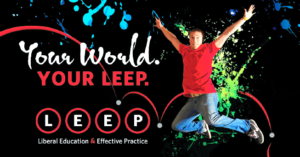 On Leap Day in 2012, Clark University celebrated the official launch of its pioneering model for higher education known as LEEP (Liberal Education and Effective Practice). Today, the first students to experience LEEP throughout their four years as “Clarkies” are preparing to graduate, making this February 29th seem an opportune time to share the progress, challenges and successes of Clark’s ambitious and innovative LEEP program.
On Leap Day in 2012, Clark University celebrated the official launch of its pioneering model for higher education known as LEEP (Liberal Education and Effective Practice). Today, the first students to experience LEEP throughout their four years as “Clarkies” are preparing to graduate, making this February 29th seem an opportune time to share the progress, challenges and successes of Clark’s ambitious and innovative LEEP program.
Clark’s LEEP goals of fusing a liberal education with intense world, workplace and personal experiences has demanded deep, deliberate and creative change across the campus community. The decision to embark on this bold initiative was based on years of research in the learning sciences and emerging adulthood, guided by the essential learning outcomes of the Association of American Colleges and Universities (AAC&U).
“LEEP reaffirms the hallmarks of a Clark education … We are deepening and aligning the connections among all aspects of a Clark education through innovative curriculum initiatives, through creative new approaches to student advising and mentorship, and through impactful partnerships involving leading employers, faculty, students, staff, and alumni.”
— President David Angel, commenting at the LEEP launch event four years ago.
Clark continues to develop the LEEP model and innovative curricular and co-curricular programs designed to prepare students to lead meaningful lives. Here are some highlights:
- Establishment of LEEP Projects, one of the University’s signature programs. In the last four years, 338 students have completed LEEP Projects; more than 100 faculty and staff have served as project mentors; and over 200 organizational hosts have sponsored our students.
- Founding of the LEEP Center (comprising the offices of Academic Advising, Career Services, Community Engagement, Study Abroad, and the Writing Center). This year, the LEEP Center is on track to have held over 6,000 student appointments, assisting students with experience-building and preparations for life after Clark.
- Development of a new form of holistic advising, supporting students in their personal and professional development. For the Class of 2015, the percentage of graduates who are employed full-time, employed part-time, participating in voluntary service, serving in the U.S. Armed Forces, or enrolled in a program of continuing education at 6 months post-graduation is 97 percent (based on a knowledge rate of 85 percent).
- A new Alumni and Student Engagement Center is nearly completed and is expected to open in summer 2016. The new building will house the Clark’s LEEP Center, a space dedicated to furthering the University’s commitment to providing students with the supports and networks they need for success.
- Development of new student programs, including the Clark Athletics Service Trips (CAST) and the Presidential LEEP Scholarships. CAST has supported three service trips for student-athletes, one to Guatemala and two to the Dominican Republic. In the past three years, nine Presidential LEEP Scholars have received full tuition scholarships.
- Clark has begun implementing and sharing its innovative LEEP curricular framework, which has led to an invitation for Clark to participate in three national consortia of select colleges and universities—two organized by the AAC&U on integrative liberal learning and signature work, and one organized by the Aspen Institute.
- Major grants for curricular and student support, from: Arthur Vining Davis, and the Bringing Theory to Practice program.
- Last fall, Clark admitted its largest class on record, many of whom were drawn to apply because of the LEEP program and its philosophy.

Richard M. Freeland, ex-Commissioner of Higher Education for Massachusetts (2008 to 2015), former president of Northeastern University, and vice chair of the Clark Board of Trustees, said this about the University’s unique LEEP program:
“Clark is truly creating a new academic model that systematically links liberal learning to the world of practice at every single stage and in every dimension of the student experience. The University is doing this because its leaders believe that the enriched form of undergraduate learning that LEEP provides is what our country needs, and what our young people need, as we face the challenges of the 21st century.
“LEEP places Clark in the forefront of a movement that is changing higher education and especially enriching the great tradition of liberal learning that has represented the pinnacle of college-level education in the United States since the founding of Harvard in 1636.”
Although this “LEEP Day” at Clark won’t involve a lively celebration in Tilton Hall (complete with balloons and capturing a photo gallery of leaping Clarkies), the busy LEEP Center will mark the anniversary with cookies and refreshments, and the University will continue to apply, examine and expand LEEP’s lasting influence on student learning and success at Clark University and beyond.
